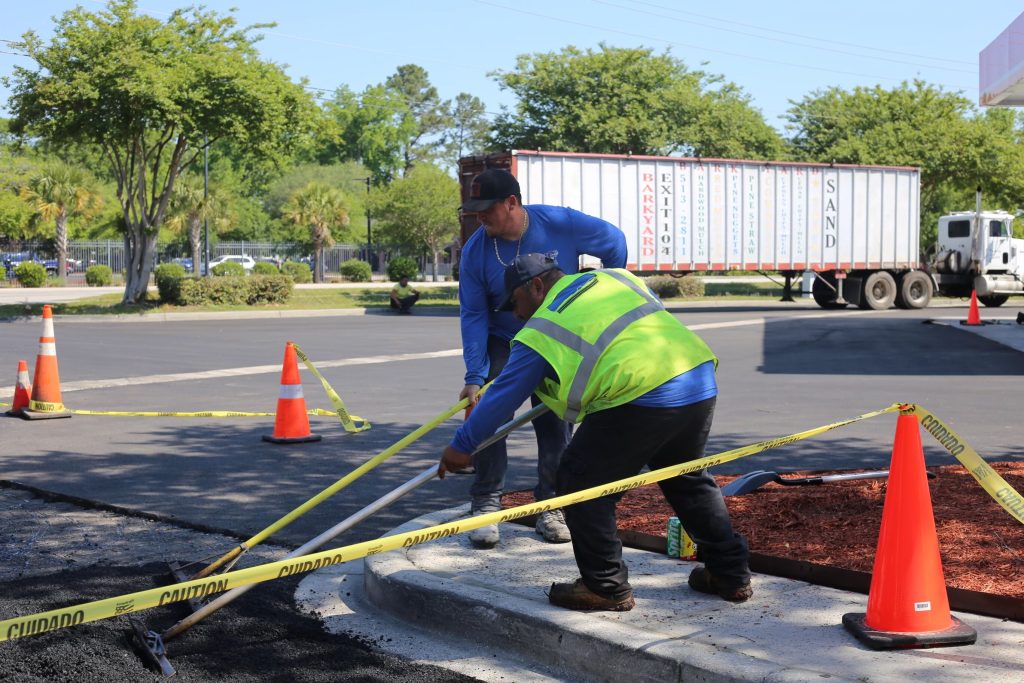Choosing a commercial asphalt contractor isn’t just about finding the lowest bid; it’s about hiring a team that can handle large-scale logistics, meet strict timelines, and deliver a surface that performs under heavy traffic for years.
Whether you’re managing an office park, shopping center, industrial facility, or HOA parking system, this guide will help you vet potential partners and make the right decision.
1. Prioritize Commercial Experience
Not all contractors are equipped to handle commercial-scale projects. You need a company that specializes in:
- Parking lots, industrial yards, and loading zones
- High-volume traffic conditions
- ADA compliance and permitting
- Drainage engineering and long-term maintenance planning
Ask for a portfolio that includes similar property types, square footage, and regional climates.
Related: Commercial Parking Lot Paving: What Businesses Need to Consider
2. Ask About Project Management & Phasing
Large commercial projects often require phased construction to minimize disruption to customers, tenants, or employees. A qualified contractor should offer:
- Clear project timelines and communication protocols
- Scheduling flexibility for nights or weekends (if needed)
- Traffic control, signage, and site staging plans
- Emergency vehicle and ADA access planning
If they can’t explain how they’ll handle operational logistics, they’re not the right fit.
Related: HOA & Residential Community Asphalt Paving: Best Practices
3. Evaluate Their Technical Knowledge
Your contractor should help you choose the right asphalt solution, not just sell you one. Expect them to advise on:
- Overlay vs. full replacement strategies
- Whether milling is necessary for your project
- Asphalt thickness, compaction standards, and traffic needs
- Drainage design and water management
They should also be able to identify early warning signs that your current pavement is failing.
Related:
- When to Choose an Asphalt Overlay vs. Full Repaving
- Signs Your Commercial Asphalt Needs Resurfacing or Replacement
4. Review Licensing, Insurance & Certifications
A commercial paving contractor must carry:
- Active business and contractor licenses
- General liability insurance
- Workers’ compensation coverage
- Manufacturer certifications (e.g., for sealcoating products or asphalt mix)
You should also ask about warranty terms—both for labor and materials.
5. Get a Detailed Proposal Instead Of Just a Quote
A reputable contractor won’t just toss out a square-foot price. You should receive a full written scope that includes:
- Base prep and grading
- Milling or overlay details
- Thickness of asphalt layers
- Site-specific drainage considerations
- Traffic control plans
- Striping, signage, and ADA elements
Look for transparency—vague proposals are red flags.
Related: How Much Does Commercial Asphalt Paving Cost? A Complete Breakdown
6. Understand Their Equipment & Crew Capacity
The right contractor will own or lease commercial-grade paving equipment and have experienced crews to match. Ask:
- Do they own their milling and paving machines?
- How many crews are available for large jobs?
- Can they handle multiple phases or simultaneous sites?
This is especially important for multi-lot properties, HOAs, or regional chains with multiple facilities.
7. Ask for References & Walk Through Their Past Jobs
Get 2–3 recent commercial references. Better yet, ask to visit a completed site that’s similar in scope. Look for:
- Uniform surface texture
- Smooth transitions at curb lines and drains
- Clean, straight line striping
- Minimal water pooling or surface cracking
Their work should speak for itself.
Invest in Expertise, Not Just Asphalt
Hiring the right contractor is one of the most important decisions you’ll make for your commercial property. A high-quality asphalt installation doesn’t just look better—it lasts longer, reduces repair costs, and protects your reputation.
Need help planning a commercial paving project?
Contact The Pavement Group today to schedule a consultation with a team that specializes in complex commercial jobs.
Also Read:



